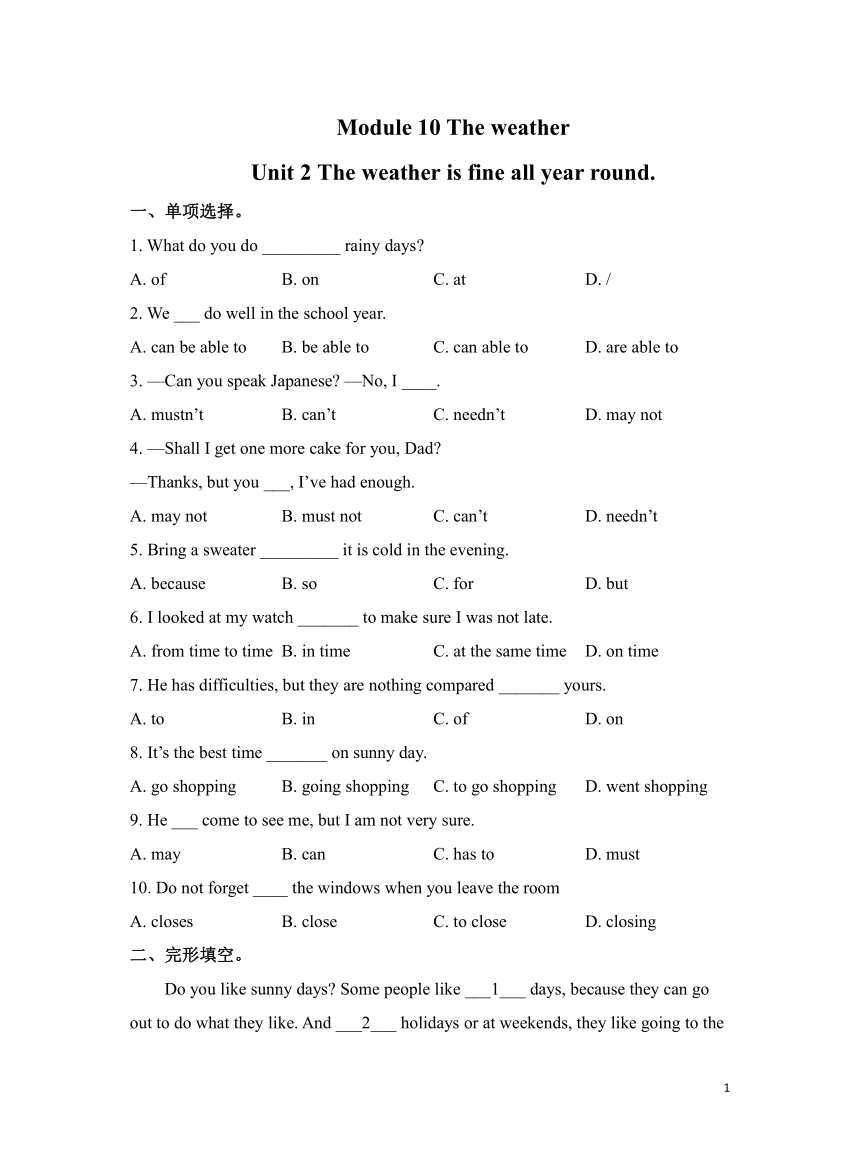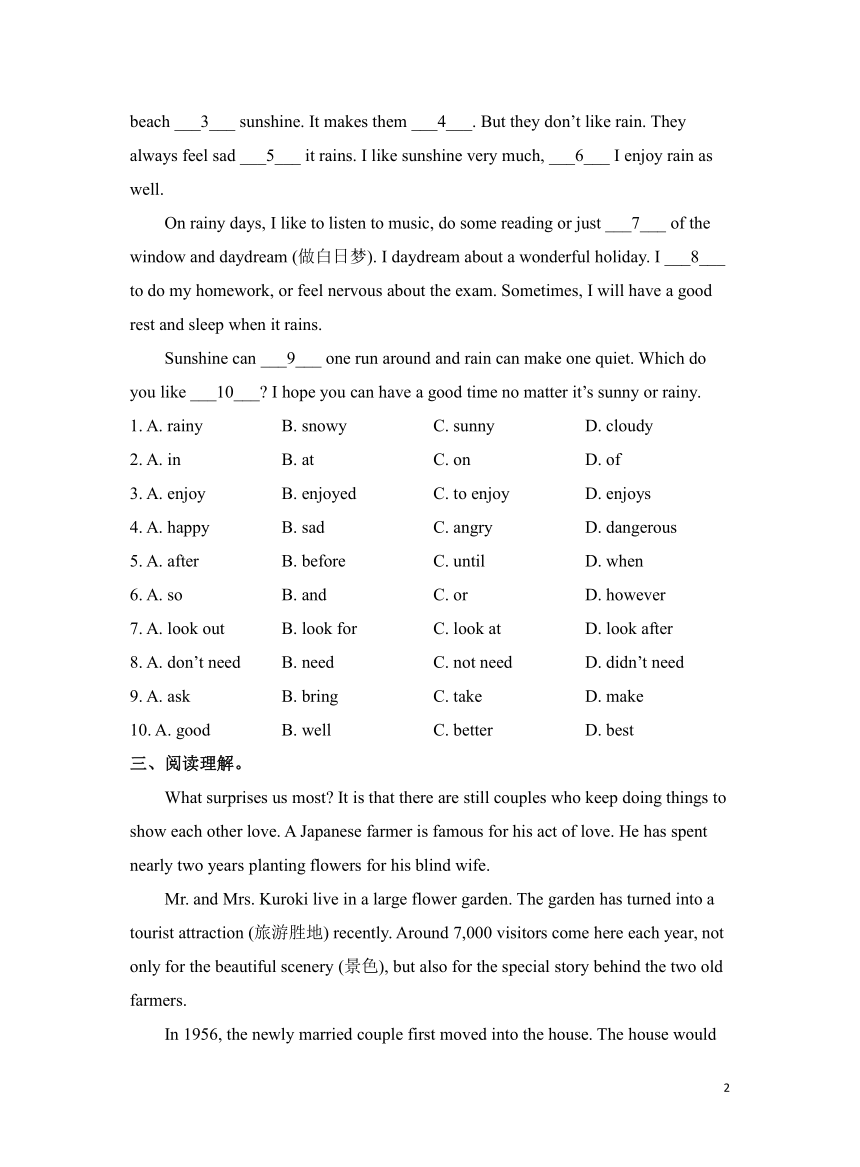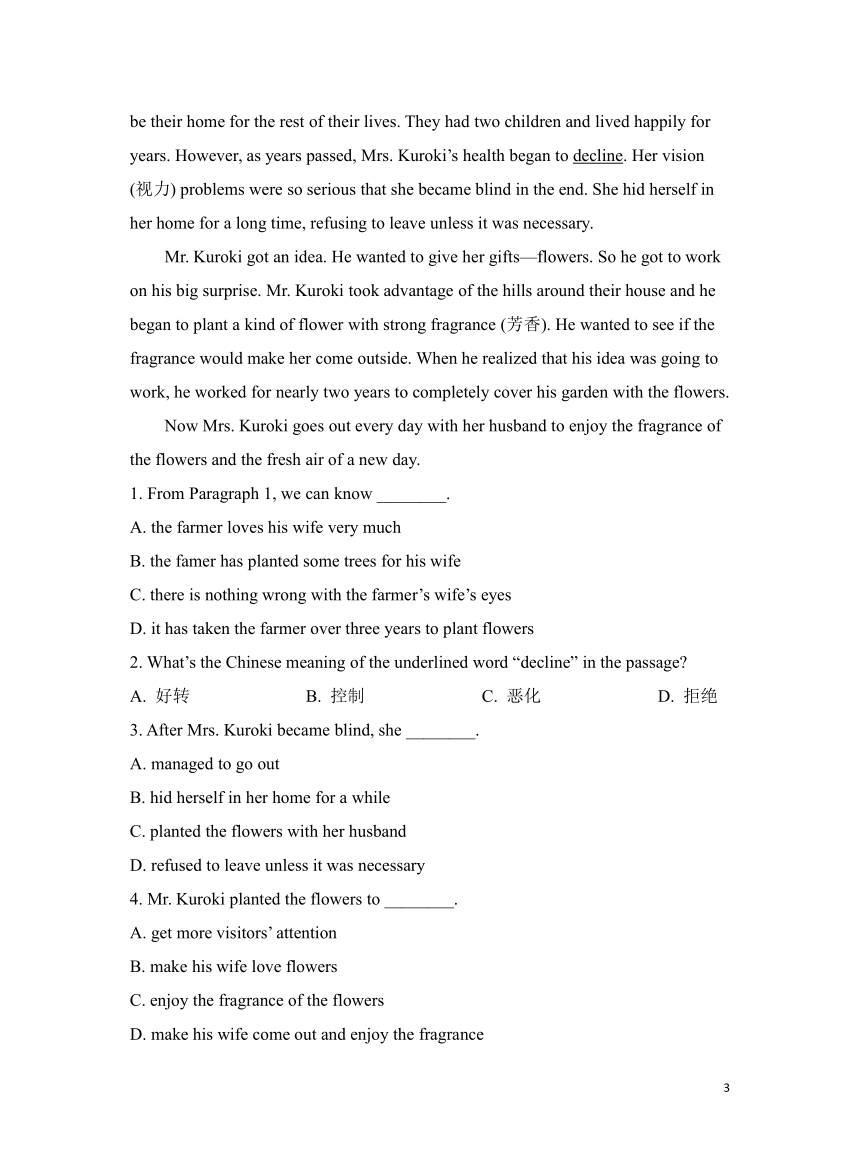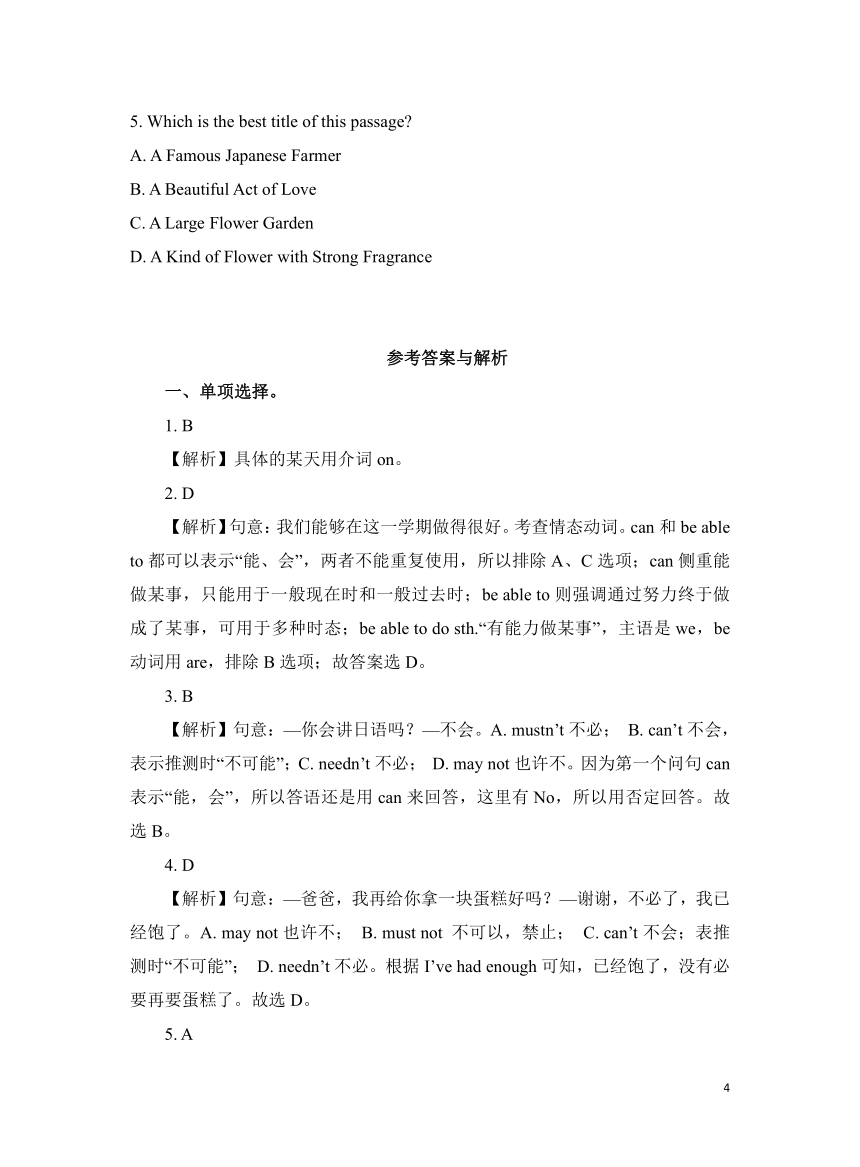初中英语外研版八上Module 10 The weather.Unit 2 The weather is fine all year round.作业(含解析)
文档属性
| 名称 | 初中英语外研版八上Module 10 The weather.Unit 2 The weather is fine all year round.作业(含解析) |  | |
| 格式 | doc | ||
| 文件大小 | 51.0KB | ||
| 资源类型 | 教案 | ||
| 版本资源 | 外研版 | ||
| 科目 | 英语 | ||
| 更新时间 | 2023-08-30 16:54:42 | ||
图片预览




文档简介
Module 10 The weather
Unit 2 The weather is fine all year round.
一、单项选择。
1. What do you do _________ rainy days
A. of B. on C. at D. /
2. We ___ do well in the school year.
A. can be able to B. be able to C. can able to D. are able to
3. —Can you speak Japanese —No, I ____.
A. mustn’t B. can’t C. needn’t D. may not
4. —Shall I get one more cake for you, Dad
—Thanks, but you ___, I’ve had enough.
A. may not B. must not C. can’t D. needn’t
5. Bring a sweater _________ it is cold in the evening.
A. because B. so C. for D. but
6. I looked at my watch _______ to make sure I was not late.
A. from time to time B. in time C. at the same time D. on time
7. He has difficulties, but they are nothing compared _______ yours.
A. to B. in C. of D. on
8. It’s the best time _______ on sunny day.
A. go shopping B. going shopping C. to go shopping D. went shopping
9. He ___ come to see me, but I am not very sure.
A. may B. can C. has to D. must
10. Do not forget ____ the windows when you leave the room
A. closes B. close C. to close D. closing
二、完形填空。
Do you like sunny days Some people like ___1___ days, because they can go out to do what they like. And ___2___ holidays or at weekends, they like going to the beach ___3___ sunshine. It makes them ___4___. But they don’t like rain. They always feel sad ___5___ it rains. I like sunshine very much, ___6___ I enjoy rain as well.
On rainy days, I like to listen to music, do some reading or just ___7___ of the window and daydream (做白日梦). I daydream about a wonderful holiday. I ___8___ to do my homework, or feel nervous about the exam. Sometimes, I will have a good rest and sleep when it rains.
Sunshine can ___9___ one run around and rain can make one quiet. Which do you like ___10___ I hope you can have a good time no matter it’s sunny or rainy.
1. A. rainy B. snowy C. sunny D. cloudy
2. A. in B. at C. on D. of
3. A. enjoy B. enjoyed C. to enjoy D. enjoys
4. A. happy B. sad C. angry D. dangerous
5. A. after B. before C. until D. when
6. A. so B. and C. or D. however
7. A. look out B. look for C. look at D. look after
8. A. don’t need B. need C. not need D. didn’t need
9. A. ask B. bring C. take D. make
10. A. good B. well C. better D. best
三、阅读理解。
What surprises us most It is that there are still couples who keep doing things to show each other love. A Japanese farmer is famous for his act of love. He has spent nearly two years planting flowers for his blind wife.
Mr. and Mrs. Kuroki live in a large flower garden. The garden has turned into a tourist attraction (旅游胜地) recently. Around 7,000 visitors come here each year, not only for the beautiful scenery (景色), but also for the special story behind the two old farmers.
In 1956, the newly married couple first moved into the house. The house would be their home for the rest of their lives. They had two children and lived happily for years. However, as years passed, Mrs. Kuroki’s health began to decline. Her vision (视力) problems were so serious that she became blind in the end. She hid herself in her home for a long time, refusing to leave unless it was necessary.
Mr. Kuroki got an idea. He wanted to give her gifts—flowers. So he got to work on his big surprise. Mr. Kuroki took advantage of the hills around their house and he began to plant a kind of flower with strong fragrance (芳香). He wanted to see if the fragrance would make her come outside. When he realized that his idea was going to work, he worked for nearly two years to completely cover his garden with the flowers.
Now Mrs. Kuroki goes out every day with her husband to enjoy the fragrance of the flowers and the fresh air of a new day.
1. From Paragraph 1, we can know ________.
A. the farmer loves his wife very much
B. the famer has planted some trees for his wife
C. there is nothing wrong with the farmer’s wife’s eyes
D. it has taken the farmer over three years to plant flowers
2. What’s the Chinese meaning of the underlined word “decline” in the passage
A. 好转 B. 控制 C. 恶化 D. 拒绝
3. After Mrs. Kuroki became blind, she ________.
A. managed to go out
B. hid herself in her home for a while
C. planted the flowers with her husband
D. refused to leave unless it was necessary
4. Mr. Kuroki planted the flowers to ________.
A. get more visitors’ attention
B. make his wife love flowers
C. enjoy the fragrance of the flowers
D. make his wife come out and enjoy the fragrance
5. Which is the best title of this passage
A. A Famous Japanese Farmer
B. A Beautiful Act of Love
C. A Large Flower Garden
D. A Kind of Flower with Strong Fragrance
参考答案与解析
一、单项选择。
1. B
【解析】具体的某天用介词on。
2. D
【解析】句意:我们能够在这一学期做得很好。考查情态动词。can和be able to都可以表示“能、会”,两者不能重复使用,所以排除A、C选项;can侧重能做某事,只能用于一般现在时和一般过去时;be able to则强调通过努力终于做成了某事,可用于多种时态;be able to do sth.“有能力做某事”,主语是we,be动词用are,排除B选项;故答案选D。
3. B
【解析】句意:—你会讲日语吗?—不会。A. mustn’t不必; B. can’t不会,表示推测时“不可能”;C. needn’t不必; D. may not也许不。因为第一个问句can表示“能,会”,所以答语还是用can来回答,这里有No,所以用否定回答。故选B。
4. D
【解析】句意:—爸爸,我再给你拿一块蛋糕好吗?—谢谢,不必了,我已经饱了。A. may not也许不; B. must not 不可以,禁止; C. can’t不会;表推测时“不可能”; D. needn’t不必。根据I’ve had enough可知,已经饱了,没有必要再要蛋糕了。故选D。
5. A
【解析】句意:带上一件毛衣,因为晚上很冷。考查连词辨析。A. because“因为”,表示因果关系,引出原因;;B. so“因此”表示因果关系,引出结果;C. for为了,表示目的;D. but但是,表示转折。根据语境可知这里是引出原因的,故答案选A。
6. A
【解析】句意:我不时地看我的手表,以确保没有迟到。考查介词短语。A. from time to time不时、有时;B. in time及时;C. at the same time同时;D. on time准时、按时。根据句意“我不时地看我的手表,以确保没有迟到。”结合选项可知A选项符合题意,故答案选A。
7. A
【解析】句意:他有困难,但与你相比微不足道。考查介词。A. to到;B. in在……里面;C. of……的;D. on在……上面。根据but they are nothing compared ___ yours.可知考查固定短语compared to“与……相比”,其它介词不能和compare搭配,故答案选A。
8. C
【解析】句意:在晴朗的日子是购物的最佳时机。考查动词不定式。根据It’s the best time ___ on sunny day.可知,这里考查句型It’s the best time to do sth.“它是做某事的最佳时间”,这里的it是形式主语,真正的主语是后面的动词不定式;go shopping固定词组,意思是“购物”;结合选项可知C选项符合题意,故答案选C。
9. A
【解析】句意:他可能来看我,但是我不确定。考查情态动词。A. may可能,用于肯定句,表示可能性;B. can能、能够,表示推测时通常用于疑问句或否定句;C. has to不得不,表示肯定语气;D. must必须,表示肯定的推测。根据后面的but I am not very sure.可知,表示不确定的推测,所以may符合题意,故答案选A。
10. C
【解析】forget to do ...忘记要做某事,此事还没有做,符合句意。 forget doing sth.忘记做过某事。
二、完形填空。
【解析】本文主要描述了作者喜欢的两种不同的天气,即晴天和雨天。作者不仅喜欢晴天,因为晴天可以让我们享受阳光,可以四处奔跑; 同时也喜欢雨天,在雨天作者可以听音乐,读书,看着窗外做着百日梦,可以睡觉并好好休息一下。
1. C句意:你喜欢晴天的日子吗?有些人喜欢晴天,因为他们可以出去做他们喜欢的事情。A. rainy下雨的;B. snowy下雪的;C. sunny晴天的; D. cloudy阴天的,根据后文“because they can go out to do what they like.”可知这里应填晴天的,故选C。
2. C句意:在假期或周末,他们喜欢去海滩享受阳光。A. in后加周,季节,月份;B. at用于具体时刻前;C. on用于日期,星期,节日前;D. of表示……的,所属关系。这里“在假期”是在具体的某一天,所以用介词on, 故选C。
3. C句意:参考第2小题。去海滩的目的是享受阳光,所以用to do不定式表示目的,故选C。
4. A句意:这使他们感到很高兴。A. happy高兴的;B. sad伤心的;C. angry生气的;D. dangerous危险的,根据句意可知去海滩使他们很高兴,故选A。
5. D句意:下雨的时候,他们都会感到很不开心。A. after 在……之后;B. before在……之前;C. until 直到;D. when当……时候,根据句意这里表示“下雨的时候,他们不开心”,所以要用when,故选D。
6. B句意:我很喜欢阳光,而且我也喜欢雨天。A. so所以;B. and并且;C. or否则;D. however然而,表转折。这里表示“喜欢……也喜欢……”,所以用and表示并列,故选B。
7. A句意:在雨天,我喜欢听音乐,读书,或者只是望着窗外做着白日梦。这里表示向窗外看,所以是look out of the window,故选A。
8. A句意:我不需要写作业,也不需要为考试而焦虑。这里是作者理想中的假期,所以是不必写作业,用否定形式,need是实义动词,否定要借助于助动词,并且也不是过去的事情,所以用don’t need,故选A。
9. D句意:阳光可以使人四处奔跑,雨可以使人安静。这里两个句子由and连接,所以and前后是对应的,and后面的动词是make, 所以and前也用动词make,故选D。
10. C句意:你更喜欢哪一个呢?这里是晴天和雨天两个进行比较,所以是比较级,“更喜欢”like better,故选C。
三、阅读理解。
【解析】文章大意:本文主要讲述了一位日本农夫因为他的妻子失明而不肯走出家门,所以他花费了两年的时间为失明的妻子种花儿,妻子闻到花儿的香味便和丈夫一起出去享受花香和新鲜空气。农夫以此来诠释了自己对妻子的爱。
1. A细节理解题。根据第一段中的信息A Japanese farmer is famous for his act of love. He has spent nearly two years planting flowers for his blind wife.一位日本农夫因其爱的行为而闻名,他花了近两年的时间为失明的妻子种花。由此可以推知这位日本的农夫非常爱自己的妻子,故答案选A。
2. C词义猜测题。根据下文Her vision problems were so serious that she became blind in the end. 她的视力问题非常严重,最后她失明了。结合However, as years passed, Mrs. Kuroki’s health began to decline. 然而,随着时间的流逝,黑木夫人的健康开始……。可知是她的健康开始“恶化、衰退”,所以C选项符合题意,故答案选C。
3. D细节理解题。根据Her vision problems were so serious that she became blind in the end. She hid herself in her home for a long time, refusing to leave unless it was necessary. 她的视力问题非常严重,最后她失明了。她把自己藏在家里很长一段时间,除非有必要,否则她拒绝离开。可知,黑木夫人失明后,除非有必要,否则她拒绝离开。故答案选D。
4. D细节理解题。根据He wanted to see if the fragrance would make her come outside. When he realized that his idea was going to work, he worked for nearly two years to completely cover his garden with the flowers.他想看看这香味是否能让她走到外面来。当他意识到自己的想法会奏效时,他花了近两年的时间用鲜花把花园完全覆盖起来。可知,黑木先生种花是为了让他的妻子走出来享受花香,故答案选D。
5. B标题归纳题。通读全文,可知本文主要讲述了一位日本的农夫因为妻子种花而闻名的爱情故事。结合选项,可知B选项A Beautiful Act of Love“一个美丽的爱的行为”符合题意,故答案选B。
1
Unit 2 The weather is fine all year round.
一、单项选择。
1. What do you do _________ rainy days
A. of B. on C. at D. /
2. We ___ do well in the school year.
A. can be able to B. be able to C. can able to D. are able to
3. —Can you speak Japanese —No, I ____.
A. mustn’t B. can’t C. needn’t D. may not
4. —Shall I get one more cake for you, Dad
—Thanks, but you ___, I’ve had enough.
A. may not B. must not C. can’t D. needn’t
5. Bring a sweater _________ it is cold in the evening.
A. because B. so C. for D. but
6. I looked at my watch _______ to make sure I was not late.
A. from time to time B. in time C. at the same time D. on time
7. He has difficulties, but they are nothing compared _______ yours.
A. to B. in C. of D. on
8. It’s the best time _______ on sunny day.
A. go shopping B. going shopping C. to go shopping D. went shopping
9. He ___ come to see me, but I am not very sure.
A. may B. can C. has to D. must
10. Do not forget ____ the windows when you leave the room
A. closes B. close C. to close D. closing
二、完形填空。
Do you like sunny days Some people like ___1___ days, because they can go out to do what they like. And ___2___ holidays or at weekends, they like going to the beach ___3___ sunshine. It makes them ___4___. But they don’t like rain. They always feel sad ___5___ it rains. I like sunshine very much, ___6___ I enjoy rain as well.
On rainy days, I like to listen to music, do some reading or just ___7___ of the window and daydream (做白日梦). I daydream about a wonderful holiday. I ___8___ to do my homework, or feel nervous about the exam. Sometimes, I will have a good rest and sleep when it rains.
Sunshine can ___9___ one run around and rain can make one quiet. Which do you like ___10___ I hope you can have a good time no matter it’s sunny or rainy.
1. A. rainy B. snowy C. sunny D. cloudy
2. A. in B. at C. on D. of
3. A. enjoy B. enjoyed C. to enjoy D. enjoys
4. A. happy B. sad C. angry D. dangerous
5. A. after B. before C. until D. when
6. A. so B. and C. or D. however
7. A. look out B. look for C. look at D. look after
8. A. don’t need B. need C. not need D. didn’t need
9. A. ask B. bring C. take D. make
10. A. good B. well C. better D. best
三、阅读理解。
What surprises us most It is that there are still couples who keep doing things to show each other love. A Japanese farmer is famous for his act of love. He has spent nearly two years planting flowers for his blind wife.
Mr. and Mrs. Kuroki live in a large flower garden. The garden has turned into a tourist attraction (旅游胜地) recently. Around 7,000 visitors come here each year, not only for the beautiful scenery (景色), but also for the special story behind the two old farmers.
In 1956, the newly married couple first moved into the house. The house would be their home for the rest of their lives. They had two children and lived happily for years. However, as years passed, Mrs. Kuroki’s health began to decline. Her vision (视力) problems were so serious that she became blind in the end. She hid herself in her home for a long time, refusing to leave unless it was necessary.
Mr. Kuroki got an idea. He wanted to give her gifts—flowers. So he got to work on his big surprise. Mr. Kuroki took advantage of the hills around their house and he began to plant a kind of flower with strong fragrance (芳香). He wanted to see if the fragrance would make her come outside. When he realized that his idea was going to work, he worked for nearly two years to completely cover his garden with the flowers.
Now Mrs. Kuroki goes out every day with her husband to enjoy the fragrance of the flowers and the fresh air of a new day.
1. From Paragraph 1, we can know ________.
A. the farmer loves his wife very much
B. the famer has planted some trees for his wife
C. there is nothing wrong with the farmer’s wife’s eyes
D. it has taken the farmer over three years to plant flowers
2. What’s the Chinese meaning of the underlined word “decline” in the passage
A. 好转 B. 控制 C. 恶化 D. 拒绝
3. After Mrs. Kuroki became blind, she ________.
A. managed to go out
B. hid herself in her home for a while
C. planted the flowers with her husband
D. refused to leave unless it was necessary
4. Mr. Kuroki planted the flowers to ________.
A. get more visitors’ attention
B. make his wife love flowers
C. enjoy the fragrance of the flowers
D. make his wife come out and enjoy the fragrance
5. Which is the best title of this passage
A. A Famous Japanese Farmer
B. A Beautiful Act of Love
C. A Large Flower Garden
D. A Kind of Flower with Strong Fragrance
参考答案与解析
一、单项选择。
1. B
【解析】具体的某天用介词on。
2. D
【解析】句意:我们能够在这一学期做得很好。考查情态动词。can和be able to都可以表示“能、会”,两者不能重复使用,所以排除A、C选项;can侧重能做某事,只能用于一般现在时和一般过去时;be able to则强调通过努力终于做成了某事,可用于多种时态;be able to do sth.“有能力做某事”,主语是we,be动词用are,排除B选项;故答案选D。
3. B
【解析】句意:—你会讲日语吗?—不会。A. mustn’t不必; B. can’t不会,表示推测时“不可能”;C. needn’t不必; D. may not也许不。因为第一个问句can表示“能,会”,所以答语还是用can来回答,这里有No,所以用否定回答。故选B。
4. D
【解析】句意:—爸爸,我再给你拿一块蛋糕好吗?—谢谢,不必了,我已经饱了。A. may not也许不; B. must not 不可以,禁止; C. can’t不会;表推测时“不可能”; D. needn’t不必。根据I’ve had enough可知,已经饱了,没有必要再要蛋糕了。故选D。
5. A
【解析】句意:带上一件毛衣,因为晚上很冷。考查连词辨析。A. because“因为”,表示因果关系,引出原因;;B. so“因此”表示因果关系,引出结果;C. for为了,表示目的;D. but但是,表示转折。根据语境可知这里是引出原因的,故答案选A。
6. A
【解析】句意:我不时地看我的手表,以确保没有迟到。考查介词短语。A. from time to time不时、有时;B. in time及时;C. at the same time同时;D. on time准时、按时。根据句意“我不时地看我的手表,以确保没有迟到。”结合选项可知A选项符合题意,故答案选A。
7. A
【解析】句意:他有困难,但与你相比微不足道。考查介词。A. to到;B. in在……里面;C. of……的;D. on在……上面。根据but they are nothing compared ___ yours.可知考查固定短语compared to“与……相比”,其它介词不能和compare搭配,故答案选A。
8. C
【解析】句意:在晴朗的日子是购物的最佳时机。考查动词不定式。根据It’s the best time ___ on sunny day.可知,这里考查句型It’s the best time to do sth.“它是做某事的最佳时间”,这里的it是形式主语,真正的主语是后面的动词不定式;go shopping固定词组,意思是“购物”;结合选项可知C选项符合题意,故答案选C。
9. A
【解析】句意:他可能来看我,但是我不确定。考查情态动词。A. may可能,用于肯定句,表示可能性;B. can能、能够,表示推测时通常用于疑问句或否定句;C. has to不得不,表示肯定语气;D. must必须,表示肯定的推测。根据后面的but I am not very sure.可知,表示不确定的推测,所以may符合题意,故答案选A。
10. C
【解析】forget to do ...忘记要做某事,此事还没有做,符合句意。 forget doing sth.忘记做过某事。
二、完形填空。
【解析】本文主要描述了作者喜欢的两种不同的天气,即晴天和雨天。作者不仅喜欢晴天,因为晴天可以让我们享受阳光,可以四处奔跑; 同时也喜欢雨天,在雨天作者可以听音乐,读书,看着窗外做着百日梦,可以睡觉并好好休息一下。
1. C句意:你喜欢晴天的日子吗?有些人喜欢晴天,因为他们可以出去做他们喜欢的事情。A. rainy下雨的;B. snowy下雪的;C. sunny晴天的; D. cloudy阴天的,根据后文“because they can go out to do what they like.”可知这里应填晴天的,故选C。
2. C句意:在假期或周末,他们喜欢去海滩享受阳光。A. in后加周,季节,月份;B. at用于具体时刻前;C. on用于日期,星期,节日前;D. of表示……的,所属关系。这里“在假期”是在具体的某一天,所以用介词on, 故选C。
3. C句意:参考第2小题。去海滩的目的是享受阳光,所以用to do不定式表示目的,故选C。
4. A句意:这使他们感到很高兴。A. happy高兴的;B. sad伤心的;C. angry生气的;D. dangerous危险的,根据句意可知去海滩使他们很高兴,故选A。
5. D句意:下雨的时候,他们都会感到很不开心。A. after 在……之后;B. before在……之前;C. until 直到;D. when当……时候,根据句意这里表示“下雨的时候,他们不开心”,所以要用when,故选D。
6. B句意:我很喜欢阳光,而且我也喜欢雨天。A. so所以;B. and并且;C. or否则;D. however然而,表转折。这里表示“喜欢……也喜欢……”,所以用and表示并列,故选B。
7. A句意:在雨天,我喜欢听音乐,读书,或者只是望着窗外做着白日梦。这里表示向窗外看,所以是look out of the window,故选A。
8. A句意:我不需要写作业,也不需要为考试而焦虑。这里是作者理想中的假期,所以是不必写作业,用否定形式,need是实义动词,否定要借助于助动词,并且也不是过去的事情,所以用don’t need,故选A。
9. D句意:阳光可以使人四处奔跑,雨可以使人安静。这里两个句子由and连接,所以and前后是对应的,and后面的动词是make, 所以and前也用动词make,故选D。
10. C句意:你更喜欢哪一个呢?这里是晴天和雨天两个进行比较,所以是比较级,“更喜欢”like better,故选C。
三、阅读理解。
【解析】文章大意:本文主要讲述了一位日本农夫因为他的妻子失明而不肯走出家门,所以他花费了两年的时间为失明的妻子种花儿,妻子闻到花儿的香味便和丈夫一起出去享受花香和新鲜空气。农夫以此来诠释了自己对妻子的爱。
1. A细节理解题。根据第一段中的信息A Japanese farmer is famous for his act of love. He has spent nearly two years planting flowers for his blind wife.一位日本农夫因其爱的行为而闻名,他花了近两年的时间为失明的妻子种花。由此可以推知这位日本的农夫非常爱自己的妻子,故答案选A。
2. C词义猜测题。根据下文Her vision problems were so serious that she became blind in the end. 她的视力问题非常严重,最后她失明了。结合However, as years passed, Mrs. Kuroki’s health began to decline. 然而,随着时间的流逝,黑木夫人的健康开始……。可知是她的健康开始“恶化、衰退”,所以C选项符合题意,故答案选C。
3. D细节理解题。根据Her vision problems were so serious that she became blind in the end. She hid herself in her home for a long time, refusing to leave unless it was necessary. 她的视力问题非常严重,最后她失明了。她把自己藏在家里很长一段时间,除非有必要,否则她拒绝离开。可知,黑木夫人失明后,除非有必要,否则她拒绝离开。故答案选D。
4. D细节理解题。根据He wanted to see if the fragrance would make her come outside. When he realized that his idea was going to work, he worked for nearly two years to completely cover his garden with the flowers.他想看看这香味是否能让她走到外面来。当他意识到自己的想法会奏效时,他花了近两年的时间用鲜花把花园完全覆盖起来。可知,黑木先生种花是为了让他的妻子走出来享受花香,故答案选D。
5. B标题归纳题。通读全文,可知本文主要讲述了一位日本的农夫因为妻子种花而闻名的爱情故事。结合选项,可知B选项A Beautiful Act of Love“一个美丽的爱的行为”符合题意,故答案选B。
1
同课章节目录
- Module 1 How to learn English
- Unit 1 Let's try to speak English as much as possi
- Unit 2 You should smile at her.
- Unit 3 Language in use .
- Module 2 My home town and my country
- Unit 1 It's taller than many other buildings.
- Unit 2 Cambridge is a beautiful city in the east o
- Unit 3 Language in use .
- Module 3 Sports.
- Unit 1 Nothing is more exciting than playing tenni
- Unit 2 This year we training more carefully.
- Unit 3 Language in use .
- Module 4 Planes, ships and trains .
- Unit 1 He lives the farthest from school.
- Unit 2 What is the best way to travel.
- Unit 3 Language in use .
- Module 5 Lao She Teahouse.
- Unit 1 I wanted to see the Beijing Opera.
- Unit 2 It descibes the changes in Chinese society.
- Unit 3 Language in use .
- Module 6 Animals in danger.
- Unit 1 It allows people to get closer to them .
- Unit 2 The WWF is working hard to save them all.
- Unit 3 Language in use .
- Revision module A
- Module 7 A famous story
- Unit 1 Alice was sitting with her sister by the ri
- Unit 2 She was thinking about her cat.
- Unit 3 Language in use .
- Module 8 Accidents
- Unit 1 While the car were changing to red, a car s
- Unit 2 I was trying to pick it up when it bite me
- Unit 3 Language in use .
- Module 9 Population
- Unit 1 The population of China is about 1.37 billi
- Unit 2 Arnwick was a city with 200,000 people.
- Unit 3 Language in use .
- Module 10 The weathe
- Unit 1 It might snow.
- Unit 2 The weather is fine all year round.
- Unit 3 Language in use .
- Module 11 Way of life
- Unit 1 In China ,we open a gift later.
- Unit 2 In England, you usually drink tea with milk
- Unit 3 Language in use .
- Module 12 Help
- Unit 1 What should we do before help arrives?
- Unit 2 Stay away from windows and heavy furniture.
- Unit 3 Language in use .
- Revision module B
